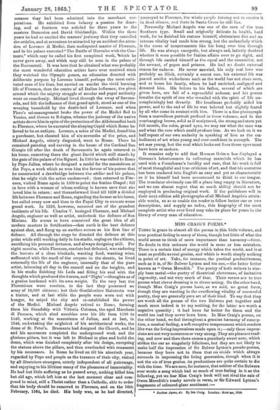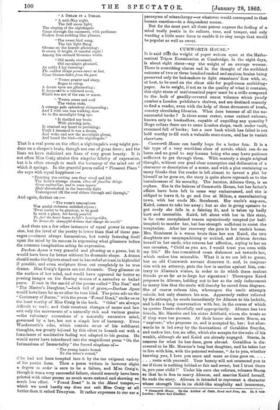MISS CRAIG'S POEMS..
• Aldan dynes, ikc. By la& Craig. London: Bira`lan,1864. THERE is grace in almost all the poems in this little volume, and true poetical feeling in many of them, though but little of what the world seems to think of more importance than harmony—force. No doubt in this estimate the world is more or less mistaken. There is a certain kind of energy which takes the world, and is at least as prolific as real genius, and which is worth simply nothing in point of art. Take, for instance, the poetical productiveness, such as it is, of Sir Bulwer Lytton and his son,—the latter better known as " Owen Meredith." The poetry of both writers is sim- ply base metal—the poetry of theatrical cleverness, of imitative ingenuity, and not very much of that. Their verses are to true poems what clever dressing is to clever acting. On the other hand, though Miss Craig's poems have, as we said, no great force, though they are wanting in the overflowing vitality of successful poetry, they are generally pure art of their kind. To say that they are worth all the poems of the two Bulwers put together and much more indeed is to say nothing, for the latter are worth a negative quantity ; it had been far better for them and the world too had they never been born. In Miss Craig's poems, on the other hand, we feel throughout a genuine harmony of concep- tion, a musical feeling, a soft receptive temperament which renders like wax the living impressions made upon it ;—only these impres- sions are not very numerous or very strong. They are pleasant read- ing, and now and then there comes a peculiarly sweet note, which strikes the ear as singularly felicitous, but they are not likely to make half the impression of Sir Bulwer Lytton's pseudo-poems, because they have not in them that via vivida which always succeeds in impressing the living generation, though when it is not the via of true genius, its productions are quite certain to die with the time. We are sure, for instance, that neither of the Bulwers ever wrote a song which had so much of true feeling in it as the following, yet we fear Miss Craig's book will not rival the sale of Owen Meredith's trashy novels in verse, or Sir Edward Lytton's fragments of coloured-glass sentiment :— "A DREAM IN A DREA3I.
" A mid-May night,
The full moon light, The singing of the nightingale Came through the casement, with perfumes Shaken from nodding lilac plumes.
"The sweet bird sung, The fair light flung Gleams on the laurels glistening: O sweet, 0 bright, 0 tuneful night ! Among the orchard blossoms white.
" Old music streamed, Old moonlight gleamed, As softly I lay listening : The saddest things grown sweet at last, Came blossom-laden from the past.
"'Tween prayer and sleep, Began to creep, A dream upon me glimmering ; It deepened to a visioned noon, Which was not of the sun or moon.
'Tween sense and soul The vision stole,
A strange pale splendour shimmering ;
And I with one was walking slow As in the moonlight long ago.
"It thrilled my brain With piercing pain, It crushed my heart to perishing; Until I dreamed it was a dream, And woke and saw the moonlight gleam, And heard the bird—the nightingale."
That is a real poem on the effect a nightingale's song might pro- duce on a sleeper's brain, though not one of great force; and the lines we have italicized are lines of very great beauty. It is not often Miss Craig attains this singular felicity of expression, but it is often enough to mark the harmony of the mind out of which it springs. In the graceful poem called " Pleasant Place " she says with equal happiness :-
"Fronting the setting sun they stood and felt
The hour's strange charm, when all familial. things Grow unfamiliar, and to sense appear Half disembodied, in the heavenly light
Transfigured till the soul shines through and through."
And again, further on:— " The room's atmosphere
Was genial richness, satisfied repose ; 'Twas easier to be gracious, to be good In such a place, but barely possible To feel the heart heave to life's heaving tides, Or dream the changeful dreams that change the world."
And there are a few other instances of equal power in expres- sion, but the level of the poetry is lower than that of these pas- sages ;—almost always harmonious, but rarely fastening itself upon the mind by its success in expressing what glimmers before the common imagination asking for expression.
Duchess Agnes is very graceful and pleasing as a poem, but it would have been far better without its dramatic shape. A drama should make the figures stand out in bas-relief at least, in highrelief if possible, and even sculpture them out completely to be true drama. Miss Craig's figures are not dramatic. They glimmer on the surface of her mind, and would have appeared far better as passing images on the flowing stream of a narrative or ballad poem. If cast in the mould of the poems called " The Nest" and "The Master's Daughter,"—both full of grace,—Duchess Agnes would have been far more after its true kind. The prize ode on the " Centenary of Burns," with the poem "Found Dead," strike us as the least worthy of Miss Craig in the book. " Odes' are always difficult to read ; and their constant changes of metre and law suit only the movements of a naturally rich and various genius —the voluntary excursions of a naturally excursive mind, governed by a law, but not a simple law of harmony, Even Wordsworth's odes, which contain some of his sublimest thoughts, are greatly injured by this effort to branch out with a luxuriance of meditative feeling not adapted to his genius. He would never have introduced into the magnificent poem " On the
Intimations of Immortality" the forced simplesse of- " The young lambs bound To the tabor's sound,"
if he had not been tempted into it by the too exigeant variety of his poetic form. Then a poem written in however slight a degree to order is sure to be a failure, and Miss Craig's,
though it was a very successful failure, should scarcely have been printed with other poems so much more natural and showing so much less effort. " Found Dead" is in the Maud temper,— which we need hardly-say does not suit Miss Craig- at all
better than it suited Tennyson. It' rather expresses to our ear a paroxysm of misanthropy—or whatever would correspond to that human emotion—in a despondent mouse.
But for the most part all these poems express the feeling of a mind really poetic in its culture, tone, and temper, and only wanting a little more force to enable it to sing songs that would be popular as well as sweet.

































 Previous page
Previous page